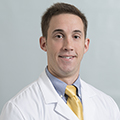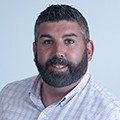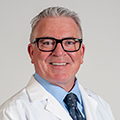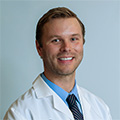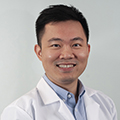Harvard-MGH Foot and Ankle Fellowship
Contact Information
Daniel Guss, MD
Director, Foot & Ankle Fellowship Program
Department of Orthopaedic Surgery
Yawkey Building for Outpatient Care, Suite 3F
55 Fruit Street
Boston,
MA
02114
Phone: 617-643-5701
Fellowship Contact: Marta Hyatt, mnhyatt@partners.org
Foot & Ankle Fellowship Info Packet
Foot & Ankle Fellow Case Logs
Foot & Ankle Faculty Biographies
Explore the Foot & Ankle Fellowship
Overview
Thank you for your interest in the Harvard Medical School/Massachusetts General Hospital Orthopaedic Foot and Ankle Fellowship program.
Our commitment is to help you develop into an accomplished orthopaedic foot and ankle surgeon – clinically insightful, technically capable across a wide range of surgical procedures, and a critical analyst of the latest research. We pride ourselves on the interdisciplinary care of each patient, working as a team with other surgical and medical specialties, as well as podiatrists, physical therapists, cast techs, medical assistants, research assistants and support staff.
Fellowship Structure
The program offers three fellowship positions of one-year duration. Eligible fellows must have successfully graduated from an orthopaedic residency program. Fellows are credentialed at Massachusetts General Hospital (MGH), the flagship teaching hospital of Harvard Medical School, as well as Newton-Wellesley Hospital (NWH), a 300-bed community hospital in a nearby suburb.
The current fellowship is divided into three separate four-month blocks based on a mentorship model designed to foster lifelong friendships. You will spend four months with:
- Drs. John Kwon & Daniel Guss
- Drs. Christopher DiGiovanni & Amgad Haleem
- Drs. Greg Waryasz & Lorena Bejarano-Pineda
This structure allows exposure to all staff while preserving a one-on-one relationship. Flexibility exists and these are not isolated silos. Cross-pollination frequently occurs and fellows are enabled to adapt their schedule to attend unique cases or learning opportunities, even if outside their “block”. Furthermore, exposure to all faculty year round is achieved through various didactic sessions, conferences, journal clubs, labs and other academic teaching sessions. Our overarching goal is that this be a learning-based fellowship rather than anything remotely service-based – you have worked hard as a resident and now is the time for you to immerse yourself in the pure learning of foot and ankle!
Our fellowship is always looking for ways to maximize our fellows’ education. As part of forming the Mass General Brigham network, Massachusetts General Hospital is merging with its academic counterpart, Brigham & Women’s Hospital, and the Department of Orthopaedics is uniting under a single chair in 2025. We are actively exploring ways to combine the Harvard-MGH and Harvard-BWH F&A Surgery Fellowships as part of this initiative – the Harvard Foot & Ankle Surgery Fellowship. This would afford you the opportunity to expand your exposure across the entire Harvard F&A ecosystem. Rest assured that we will always be a mentorship-based fellowship.
Fellows with full licenses are credentialed at all hospitals and clinical sites as full attending physicians, with the goal of progressively nurturing a high degree of independence in both the operating room and clinic settings. Through an apprenticeship model with graduated autonomy, fellows are comfortable running their own foot and ankle clinic and are technically capable of independently operating on a spectrum of complex foot and ankle pathology by the end of their fellowship year. The opportunity to operate independently with immediate attending backup readily available, as a supplement to the expansive amount of time spent operating alongside an attending, is something past fellows have relished.
Fellows also run a longitudinal clinic that parallels clinics run by the attending staff. Fellows see their own patients one clinic day a week in order to foster independent decision-making, management strategies, and ownership of care. These are not “fellows’ clinics” that differentially triage patients and pathologies – we all see everybody, irrespective of background or ability to pay, and this philosophy about caring for patients is part of our DNA. As always, attending staff are readily available to answer questions and facilitate the care of patients.
Educational Program - Basic Curriculum
- General requirements: In accordance with the general teachings defined by the American Orthopaedic Foot & Ankle Society, our Fellowship program emphasizes professionalism, clinical competence and system-based practice.
- Professionalism: The fellows are expected to demonstrate respect, compassion, and integrity to their patients, colleagues, and staff. They are expected to be responsive to the needs of their patients and demonstrate commitment to excellence and on-going professional development.
- Clinical competence: The fellowship has been designed to develop advanced technical competence in the field of foot and ankle. Focus will be on advanced skills in the operating room, diagnostic competence in the clinic, and will foster analytic research excellence through our robust research program.
- Surgical experience: The fellow is scheduled in the operating room 3-4 days/week with an attending faculty member. The fellow will operate in the Main OR at both MGH and NWH, as well as our Ambulatory Care Centers at MGH Waltham, NWH and Northshore Danvers.
- Outpatient experience: The fellows are scheduled in clinic 1-2 days/week, either independently or with a faculty member. The outpatient clinics allow the fellows the chance to follow patients they have operated on, to see new patients and devise management plans. The fellows have their “own patients” and are expected to manage all patient needs with input from faculty as necessary and with assistance from our administrative staff and physician extenders.
- Inpatient responsibilities: There are three fellows and one PGY-3 Harvard orthopaedic resident on service. The inpatient care is typically divided up by the service member who is on site at MGH for the day. Rounding responsibilities are shared so that “many hands make light work” and fellows infrequently have to round at one site and then travel to another. There is a physician extender for floor coverage at both MGH and NWH hospitals who assist with daily management and serve as responding clinician while you are clinically engaged.
- Call responsibilities: Fellows may assist faculty who participate in call at various institutions based on clinical necessity and educational opportunity. There are no primary call responsibilities, but should unexpected needs arise (e.g., another service asks for help), we have an assigned attending every single day who is responsible for helping you navigate patient care. Fellows will round on inpatient consults and bill when appropriate.
Educational Conferences and Teaching
- Multidisciplinary topic conference: Each Tuesday morning there is a multidisciplinary conference at the Foot & Ankle Center in Waltham. The fellow is expected to attend and be an active participant. The current structure is as follows: 1st week – Faculty talks and presentations; 2nd week – Harvard-wide topic presentation by the fellows and Faculty; 3rd week – Talks/presentations by the fellows as well as journal club lead by fellows and other disciplines; 4th week – research; 5th week – talks by other disciplines. There are also several presentations by invited speakers throughout the year as well as periodic resident presentations. We also hold a combined Monday indications conference across the Harvard-system as part of maximizing fellow education.
- Indications conference: This weekly conference is held on Tuesdays. It is designed to review the indications for, and treatment options pertaining to, the surgical cases for the next 2 weeks. It is designed to be a very interactive discussion and is consistently highlighted by the Fellows as one of their best learning opportunities.
- Departmental conference: Each Thursday morning there is morbidity/mortality conference or grand rounds at MGH. Fellow attendance is expected. Fellows often present service cases at M&M conference and engage in multidisciplinary discussions with other orthopaedic surgery specialties.
- Research conference: There are weekly research meetings attended by members of the Foot & Ankle Research and Innovation Lab (FARIL), clinical faculty, national and international research fellows, residents, medical students, and other participating members of the FARIL community. These conferences occur Tuesday mornings at MGH – Waltham.
- Conferences: We believe strongly that training outside of the hospital is an important part of the fellowship experience. Each fellow is allotted a $2,000 stipend to spend on educational conferences and/or other educational related expenses. Participation in local and national conferences is strongly encouraged.
- Salary and Benefits: Salary is commensurate with that of a PGY-6 in our system. The base salary for the 2024-2025 academic year is $99,000, with additional monies as below. Salaries are adjusted by 2-3% each year. Benefits include many competitive health, dental, and vision coverage options. Each fellow is allotted 3 weeks of vacation time to use for conferences, interviews, family time and other independent endeavors.
The following adjustments will become effective beginning July 1, 2023 (Financial compensation for matched fellows for 2024-25 will be determined winter/spring 2024):- Increased annual stipends for all residents and clinical fellows to $10,000 that can be used for any purpose at the discretion of the individual.
- Mass General Brigham contributes 2% of annual base pay into a Mass General Brigham 403(b) Retirement Savings Plan for each resident and clinical fellow immediately upon hire.
- Employer-provided 60% long-term disability insurance, provided at no cost for both residents and clinical fellows.
Research
General
The Foot & Ankle Research and Innovation Lab (FARIL) opened on January 1, 2019. FARIL is a groundbreaking initiative by the Mass General Foot & Ankle service focused on pioneering breakthroughs in foot and ankle research and innovation that will directly impact the care of the foot and ankle patients. Perhaps the most important quality of FARIL is its ability to integrate all aspects of Foot & Ankle care by incorporating every facet of research. From top institutions in the US to internationally recognized academia, FARIL researchers bring their diverse training and experience to create new tests and treatments. FARIL also brings together various organizations (MGB research institute, AOFAS, Harvard) and industry leaders to implement new technology used to treat foot and ankle injuries. With patient care at its guiding focus, FARIL brings every component of foot and ankle research to one cutting-edge location.
Fellows are expected to complete two research projects throughout the academic year. By the end of the fellowship, you are expected to have two manuscripts prepared for presentation at the AOFAS meeting with the ultimate goal of publication. Multiple support staff are available to assist with the initiation and completion of projects, including several international research fellows, research students, residents, engineers, and statisticians. We know that our fellows are clinically busy, so we pair fellows with motivated researchers who can help with much of the daily work to ensure the successful completion of any project.
Facility and Equipment at FARIL
Clinical Research Database: The Research Patient Data Registry (RPDR) gathers clinical data from several hospital systems at Mass General Brigham (MGB). Researchers can obtain various clinical data using entries such as ICD or CPT codes, diagnoses or clinical terms to search for specific patient populations for their research. RPDR will provide a database that should be screened by the researchers to ensure the accuracy of the data; however, it facilitates the process of retrospective clinical research to a great extent. With the proper IRB approval, researchers may access the patient’s detailed medical records for their specified cohorts of patients. Detailed medical records may include the following types of data: Contact Information, Demographics, Diagnoses, Discharge Notes, Laboratory Tests, Medications, Microbiology, Operative Notes, Pathology Reports, Procedures, Providers, Radiology Reports, and Patient-reported outcomes. Furthermore, images from hospital image repositories can be returned and viewed online.
Operation Rooms and Experiment Equipment: FARIL has two operation rooms equipped with C-arms, weight-bearing CT scans, ultrasound, arthroscopy towers, biomechanical testing devices, and OR tools that enable researchers to conduct various experiments on cadaver specimens. Fellows may ask for lab session to practice their skillsets on cadaver specimens using various methods, devices, and implants.
Novel Technologies in Orthopaedic Foot & Ankle Surgery: FARIL possesses an AI facility, 3D modeling, 3D printing, device development tools, virtual reality, and a unique bioengineering engine that enables the fellows to design, develop, and test their innovative ideas and devices.
Meet our Team
During the year you will work closely with team members across the service, including orthopaedic foot & ankle surgeons, physician assistants and podiatrists. These include:
-
![]()
- Director, Foot & Ankle Fellowship Program
- Vice-Chair (Quality & Safety), Department of Orthopaedic Surgery, Newton-Wellesley Hospital
- Assistant Professor of Orthopaedic Surgery, Harvard Medical School
-
![]()
Amgad Haleem Ahmed Amin, MD, PhD
- Foot & Ankle Orthopaedic Surgeon
- Director, Limb Deformity & Lengthening Program
- Orthopaedic Director, Interdisciplinary Care for Amputees Network (ICAN)
-
![]()
- Professor of Orthopaedic Surgery, Harvard Medical School
- Chief Emeritus, Foot & Ankle Service; Past President, American Orthopaedic Foot and Ankle Society
- Foot & Ankle Consultant for Athletes from US National, Professional and Collegiate Programs
-
![]()
- Chief, Mass General Brigham Foot & Ankle Service
- Foot & Ankle Orthopaedic Surgeon
- Associate Professor of Orthopaedic Surgery, Harvard Medical School
-
![]()
- Foot & Ankle Orthopaedic Surgeon
- Director, Minimally Invasive Foot & Ankle Surgery
- Assistant Professor of Orthopaedic Surgery, Harvard Medical School
-
![]()
- Director, Foot & Ankle Sports Medicine
- Foot/Ankle and Knee Orthopedic Surgeon
- Head Team Orthopedist, Northeastern University
-
![]()
- Podiatrist
- Podiatric Surgeon
- Bioengineering Researcher
-
![]()
- Podiatrist
- Podiatric Surgeon
-
![]()
- Podiatrist
- Podiatric Surgeon
-
![]()
- Physician Assistant with Dr. Christopher DiGiovanni
-
![]()
- Physician Assistant with Dr. John Kwon
-
![]()
- Physician Assistant with Dr. Lorena Bejarano Pineda
-
![]()
- Physician Assistant with Dr. Gregory Waryasz
-
![]()
- Physician Assistant with Dr. Daniel Guss
A Top Hospital in America
Mass General is recognized as a top hospital on the U.S. News Best Hospitals Honor Roll for 2025-2026.
Contact the Foot & Ankle Fellowship
If you have any questions, get in touch.










